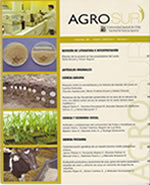An evaluation of agroecological indicators at the farm level in vineyards of Central-South Chile
Main Article Content
Abstract
In Chile, more than 80% of the organic winegrowing systems are concentrated in south-central zone of the country, a distribution that coincides with an area of high ecological value and priority for the conservation of agricultural biodiversity. In this study, a practical methodology was used to evaluate earthworm abundance and grape yield indicators for viticultural systems inserted in an agroecological transition process. These evaluations were applied in a participatory way to a group of 28 grape growers between the 2012-13 and 2013-14 agricultural seasons. A mixed linear statistical model was used and a positive change in the earthworm abundance indicator and grape productivity was found. The indicators used could be good parameters of the ecological functions to be evaluated and they would also allow and encourage the dialogue between all the actors involved in the agroecological transition process. However, further and prolonged investigations are needed to elucidate and understand the cross effects that each management practice may be causing at the ecological level on earthworm populations and their role in soil fertility and consequently on grape yields.

